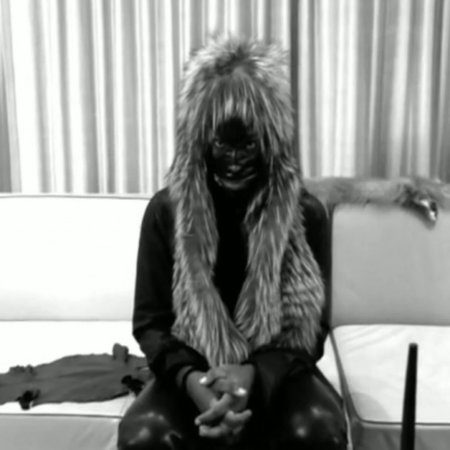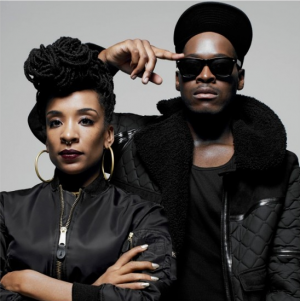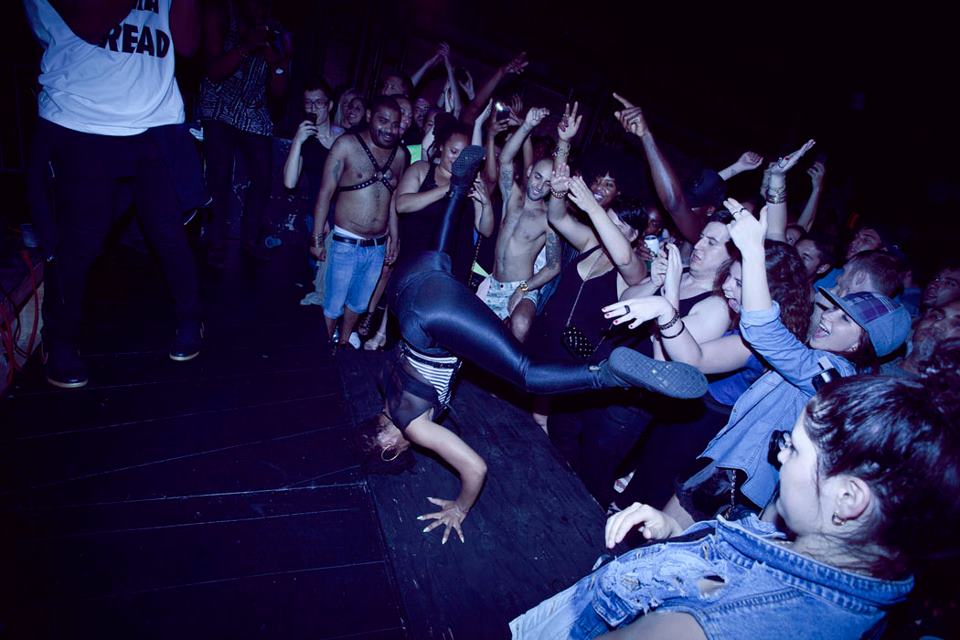
Zebra Katz is the artist name Ojay Morgan coined for himself whilst he was at college, and is one he thinks will stand the test of time. And certainly, what he produces isn't just a fad-type music throw-together that is likely to be forgotten by tomorrow. It is a considered artistic symbiosis that not only incorporates music, but accounts for theatre, fashion and dance, amongst other artistic outputs.
What is immediately discernible is that Zebra Katz presents a self-image that comes across as dark and sinister. Its verging on nightmarish, and for the faint-hearted can be interpreted as disturbing. Some lyrics threaten to 'chop', 'cut', 'slice' and 'dice that bitch'. And Zebra Katz produce dramatic black and white videography to go with it; videography that could come straight from, or find its way into, the heart of a horror movie. 'Ima Read', for example, features two masked, doll-like children occupying the abandoned library and school corridors of Brooklyn College, whilst engaging in quasi-sacrificial, slo-mo dancing. And in 'W8WTF', set to a clean, drone base with a heartbeat, Morgan this time is the faceless somebody. He is clad in a gimp mask and handcuffs, enacting what seems to be a paranoiac come-down. Either that, or entrapment within the realms of one type of MPD psyche with no idea of how he got there, featuring an alter-ego-type drinking champagne in a bath of balloons claiming you 'can't be mad if you don't see me'.
But, rather surprisingly, Morgan says he was initially unaware that the portrayal of his music was quite so menacing -- despite, for example, the presence of a Samael and Lilith pentagon as part of his lesson in the 'Ima Read' video.
Lydia Hughes: Why did you decide to translate your music in such a chilling way?
Ojay Morgan: "I was just kind of experimenting on my laptop. We only realised it when people started saying it was quite dark and sinister. But, you know, it was just the way I went at the time, and it was a sound that complimented what I was going through."
Lydia Hughes: And has a background in performance art impacted upon how dramatic and theatrical your sound and visuals are?
Ojay Morgan: "I mean, there's definitely a dramatic element added to the videos that's theatrical. And, you know, it means having that element of performance that the music industry, from my opinion, whacked up. And that's why all my live performances have gimp masks and have all these unveiling qualities that are really dark to a lot of people. But there's a lot of light that can be found in all the dark bits -- a cool parallel is drawn. And I think that is very 'Zebra Katz', because now he's at a dark place, but there's a lot of light bits and things that can be appreciated in spite of all of the darkness, too.
Lydia Hughes: Is this an intentional theme you think you'll continue with?
Ojay Morgan: "The whole process is just experimenting with music. It's just an organic trajectory. I'm just going to go with the flow of what I've been doing and see how it works."

And at live performances Zebra Katz aim for the same level of drama and theatrical spectre. The gimp mask travels with him, and the gravel tone of his rap and unbroken stare that commands your attention and entices an element of threat - even as an audience member - contribute to the chilling edge that Morgan sets within his videos. It is, after all, a performance, a show.
Although, there is an upbeat element to the show, too. Njena Reddd Foxxx, who features on a selection of Zebra Katz' tracks (including 'Ima Read'), has a great on-stage chemistry with Morgan. Between Reddd Foxxx's scissor headstands and their inter-rap, its reasonable to feel that you want to become part of the spectacle, too -- if only to join in the fun.

Lydia Hughes: And the story behind 'Ima Read'?
Ojay Morgan: "It was a track that I wrote when I was at college when I had a lot of frustration with various individuals. 'Ima Read' was kind of just like my anthem, my own mantra that I would recite to myself over and over again. And I finally decided to sit down and make the piece for it, which is kind of tribal. Later, I put it back into the universe through the internet. Fashion designer Rick Owens picked it up and made it the official track for Paris Fashion Week, which hit it off with the music industry. It led to SXSW performances, which were picked up by Rolling Stone. And it just kind of kept going. Now, we've been on tour with Azealia Banks."
Lydia Hughes: You repeat the word 'bitch' a lot in 'Ima Read'...how many times exactly?
Ojay Morgan: "Yeah, we say the word bitch, like, 87 times on the track [laughs]. Sadly, I don't think I broke the record."
Lydia Hughes: And your intention was to redefine the understanding of the word 'Bitch', right?
Ojay Morgan: "Yeah, we were trying to re-appropriate it and get new meaning for it. I basically start by saying 'Ima that bitch,' with the intention to do something to this 'bitch', and then later on I say 'I'm that bitch'. So initially we talk about this 'bitch' and what we're gonna do to this 'bitch,' then we look at school, and how in school we learn from an education. We then try to elevate it from its lowest, degrading meaning into something that is a lot more powerful. Its about how you can be clever with word-play, and how word-play can change the meaning of the term. There are so many words that are so loaded in society - like derogatory terms, race terms - that have a lot of meaning, and the meaning can dissipate depending on who's saying it; there are so many scapegoats. It might sound like I'm degrading all women, but I call myself a 'bitch,' so its playing, and depends on the context.
Lydia Hughes: And you don't just do this with language, do you? You seem to do it with the visuals within the video, too. Like, the teacher's pointer transforms from being a stable, everyday classroom instrument to then being perceived as a knife or a dagger when it is drawn, further supporting your point that the understanding of things can change depending on the context, and how you look at things.
Ojay Morgan: "[Laughs] Yeah, you're right. A lot of people don't notice that though, which is great."
Lydia Hughes: For those who watch it and say that its too disturbing or violent in terms of its imagery and language, how would you respond to them?
Ojay Morgan: "I'd say, just try to read in between the lines, think about why its affecting you...why are you affected by it? I think that is what's so great about art, it affects people differently. The masked girls definitely help bring out a lot of the darkness in the video. We shot the video in Brooklyn College. And it caused a lot of nostalgia.
If you're offended by it, maybe you're offended by the word 'bitch', but if you look deeper into it you'll realise that we're trying to re-appropriate the word 'bitch'. YouTube is a perfect example of this, because people are so open to voice their opinions and they may not necessarily get what the context is about. I mean, literacy is really important here, and there are a lot of things that one can learn from getting invested and getting involved, and trying to learn more about the context, and how we set up a situation for music theatre. There are a lot of people who will doubt the literacy in the track, but it is definitely something that needs to be brought attention to. It questions what is appropriate and what isn't appropriate, and what you can say as a voice."
Lydia Hughes: How do you feel about 'Ima Read' being deemed as this year's 212 [Azealia Banks]?
Ojay Morgan: "I think the context is completely different. And I don't think its had the longevity of 212 yet, but I certainly hope that that's the case. I think the sound is a little different, but it has got a lot of similarities there. I don't have a problem with it..."
At a time when the term 'queer rap' seems to have become a recognised stem of hip-hop, amid a genre deemed to be dominated by heteronormativity, its as though sexuality is being used to replace genre or, at the very least, used to define it. I asked Morgan for his stance on this in relation to his own music.
Ojay Morgan: "I mean, it's Zebra fucking Katz...sexuality just doesn't relate in terms of this, you know. Its all so funny. It's way more about the music than people having sex, or having sex with a man. You know, why does that matter? The main problem, I feel, is that a lot of journalists are having a discussion about gender and sexuality, and its so easy to call it 'queer rap'. I think 'queer' is an all-encompassing word that's not meant to be offensive, but when you put several artists in this category who don't necessarily sound anything alike, when they are basing it all off of sexual identity, it is. 'Queer' is not a genre. I just have to make the music and hope that people will listen to the music, as opposed to having it packaged as something for people to listen to."
Lydia Hughes: What do you have planned for the future?
Ojay Morgan: Definitely looking forward to getting back to the states. I'm going to be releasing a mixed-tape in the next three months, as well as working on some more fashion merchandise.